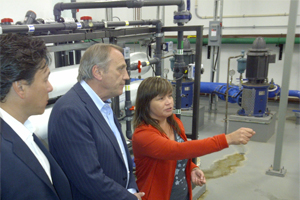
Last week, Aboriginal Affairs and Northern Development Canada (AANDC) released the long-awaited results of its National Assessment of Water and Wastewater Systems in First Nation Communities study. “This report shows that more needs to be done, especially in areas like capacity and monitoring,” said Minister John Duncan in a release.
Work is underway to address 15 water systems this year, stated the same release, and the government plans to invest in an additional 57 water systems by 2015-2016.More details on the planned response here. Is it enough?
The Liberal Party of Canada says no. Earlier this week, Liberal Critic for Aboriginal Affairs and Northern Development and the Canadian Northern Economic Development Agency, Dr. Carolyn Bennett, called on the government to fully fund improvements to First Nations Water and Wastewater systems on reserves, including the development of training and management capacity, and conduct a meaningful and productive consultation on legislation concerning safe drinking water.
“The completion of the National Assessment of First Nations Water and Wastewater Systems underscores the government’s continued neglect, with nearly 1,800 reserve homes without water or sewage service, and $1.2 billion required immediately to bring these systems up to Aboriginal Affairs and Northern Development Canada’s own protocol,” said Bennett. “The problem is far more serious than previously reported, with 39 per cent of First Nations drinking water systems rated as high risk by the assessment. The government has an obligation to commit additional new funding to address the immediate needs, in addition to an estimated $4.7 billion over the next 10 years.”
Last Friday, Council of Canadians’ Maude Barlow encouraged First Nations to speak up about federal responsibility for safe water. Yesterday, Nishnawbe Aski Nation (NAN) Deputy Grand Chief Terry Waboose said the study merely confirms what NAN and First Nations across Canada have been telling the federal government for years—that there is a critical lack of infrastructure in First Nation communities.
“We don’t need more studies to confirm what we have been saying for years,” he said. “There is a looming threat to the health and safety of NAN First Nations from the present drinking water management systems within the communities. Continued failure to address the drinking water and wastewater infrastructure within NAN First Nations will continue to lead to boil water advisories, evacuations, and poses health risks to NAN communities.”
““We support the development of water quality standards, but only if such standards are developed in consultation with NAN First Nations and are fully funded by the federal and provincial governments,” Waboose added.
Yesterday, Manitoba Keewatinowi Okimakinak Grand Chief David Harper called on premiers to amend their year-old Water Charter to include making access to clean running water a basic human right of all Canadians.









